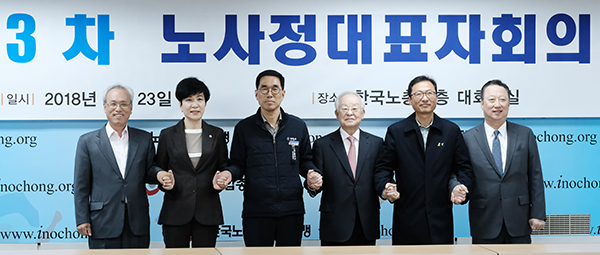
The era of the Economic and Social Development Commission plagued with confrontation and distrust since its foundation in 1998 finally comes to an end, giving place to a new social dialogue body called the Economic, Social and Labor Commission which will deliberate on the agenda on economic, social and labor issues with the expanded participation of the representatives from irregular workers, youth, women, medium-sized enterprises, small-sized enterprises and micro enterprises in the meetings of the Commission.
Top leaders representing workers, employers and the government held the 3rd tripartite representatives meeting at the head office of the Federation of Korean Trade Unions(FKTU) on Apr. 23 in Seoul and decided the reorganization plan of the new social dialogue body.
The Economic, Social and Labor Commission will be launched in a bid to unravel social polarization and to contribute to the social integration with the composition of 18 members; five members respectively representing workers and employers, two members representing the government, two members representing the social dialogue body, and four members representing public interests.
Members representing workers are five; one member each from the Federation of Korean Trade Unions(FKTU), Korean Confederation of Trade Unions(KCTU), irregular workers' organizations, youth organizations and women organizations. Members representing employers are also five; one member each from the Korea Employers Federation(KEF), Korea Chamber of Commerce and Industry(KCCI), medium-sized enterprises, small-sized enterprises and micro enterprises. The President shall appoint members representing irregular workers' organizations, youth organizations and women organizations recommended by FKTU and KCTU and also members representing medium-sized enterprises, small-sized enterprises and micro enterprises recommended by KEF and KCCI by the recommendation of the chairman of the Economic, Social and Labor Commission.
The President shall appoint four members representing public interests by the recommendation of the chairman of the Economic, Social and Labor Commission, after having heard the opinions of labor and employers. For the reason why members of public interests have increased from the current two members to four members, Park Tae-joo, ESDC standing member, explained that "The increase of members of public interests aims to strengthen the social fairness on the decisions to be made by the Economic, Social and Labor Commission."
Government representatives will be two; Minister of the Ministry of Employment and Labor and Minister of the Ministry of Strategy and Finance. If deemed necessary, the head of relevant government agency such as the Minister of the Ministry of Trade, Industry and Energy, the Minister of the Ministry of Health and Welfare, shall be entrusted as special members
In place of the standing committee of the Economic and Social Development Commission, the steering committee will be set up with the reduced members down to about ten, representatives from FKTU, KCTU, KEF, KCCI and vice-minister level officials of relevant government agencies, and the steering committee will be chaired by the standing member of the Commission.
reported by Bae Hye-jung
translated by Kim Sung-jin

